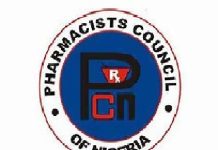-As Distillers protest ban in Lagos

The National Agency for Food and Drug Administration and Control (NAFDAC) has banned the manufacturing, sales, distribution and use of alcoholic beverages in sachets, PET and Glass bottles of 200ml and below, following the expiry date of 31 January, 2024, for the phasing out of products in these categories.
Director General, NAFDAC, Professor Moji Adeyeye made the disclosure on Monday at a media briefing with journalists, saying that the agency has not registered any of the banned products since the fixed date.
Sequel to the announcement of the ban, members of the Distillers and Blenders Association of Nigeria on Tuesday have embarked on a peaceful protest at the Lagos office of NAFDAC, asking the agency to lift the ban.
Prof. Adeyeye cited the harmful impacts of the banned alcoholic drinks on the populace, saying the most affected people are under-aged and commercial vehicle drivers and riders.
The World Health Organisation (WHO) has established that children who drink alcohol are more likely to: use drugs, get bad grades, suffer injury or death, engage in risky sexual activity, make bad decisions and have health problems.
The apex health agency also stated that harmful consumption of alcohol is linked to more than 200 health conditions including infectious diseases (tuberculosis and HIV/AIDS) and non-communicable conditions (liver cirrhosis and different types of cancer). It also associated with social problems such as alcohol addiction and gender-based violence.
The NAFDAC DG, who traced the history of the banned products to 2018, when the agency announced its intention to phase out the products, said “This decision was based on the recommendation of a high powered committee of the Federal Ministry of Health and NAFDAC on one hand, the Federal Competition and Consumer Protection Commission (FCCPC), and the Industry represented by the Association of Food, Beverages and Tobacco Employers (AFBTE), Distillers and Blenders Association of Nigeria (DIBAN), in December 2018.
“As commitment to the decision reached at the end of this committee meeting, producers of alcohol in sachets and small volume agreed to reduce the production by 5 percent with effect from 31st January 2022 while ensuring the product is completely phased out in the country by 31st January 2024.
”As at the 31st January 2024 there is no alcoholic beverage in these categories that are registered by NAFDAC. I also want to inform you that the agency has started enforcement actions for the implementation of this policy. The window period given to manufacturers by NAFDAC to sell off all alcoholic drinks in this category elapsed on the 31st January 2024”.
Adeyeye revealed the zero tolerance of the agency for any organization or persons still dealing with the banned products, said the agency views it as an act of flagrant disregard for the laws of the land for anyone to still be manufacturing or circulating alcoholic beverages in 200 ml quantities and less, while the manufacturers and printers of labels and packaging materials were the initial targets of the enforcement exercise.
She explained why the harmful drinks have become so rampant in the society, saying it is due to their small sizes, which reveals reasons for the banning.
“Alcoholic drinks in sachets, PET and Glass bottles are pocket-friendly and can easily be carried around, by the under-aged (including primary and secondary school children) without notice. It is easily affordable and comes handy for commercial bus drivers, keke riders, okada riders, etc, who after taking them constitutes nuisance to the society.
“The negative impact of the harmful consumption of alcohol which is occasioned by its being economical, easily accessible and miniature in nature, prompted NAFDAC to take the bold step of banning it, in order to save our children and to protect the health of the larger society.
“It will surprise you to know that in the course of the enforcement actions it was discovered that some manufacturers of these banned products were still in production of the banned products and still had stacks of both finished products and packaging materials of the products in their possession. This situation is of course not acceptable and the agency views this as flagrant disobedience to the laws of Nigeria. NAFDAC views this matter seriously and will engage all statutory means, which may include prosecution, to deal with the matter” she said.










